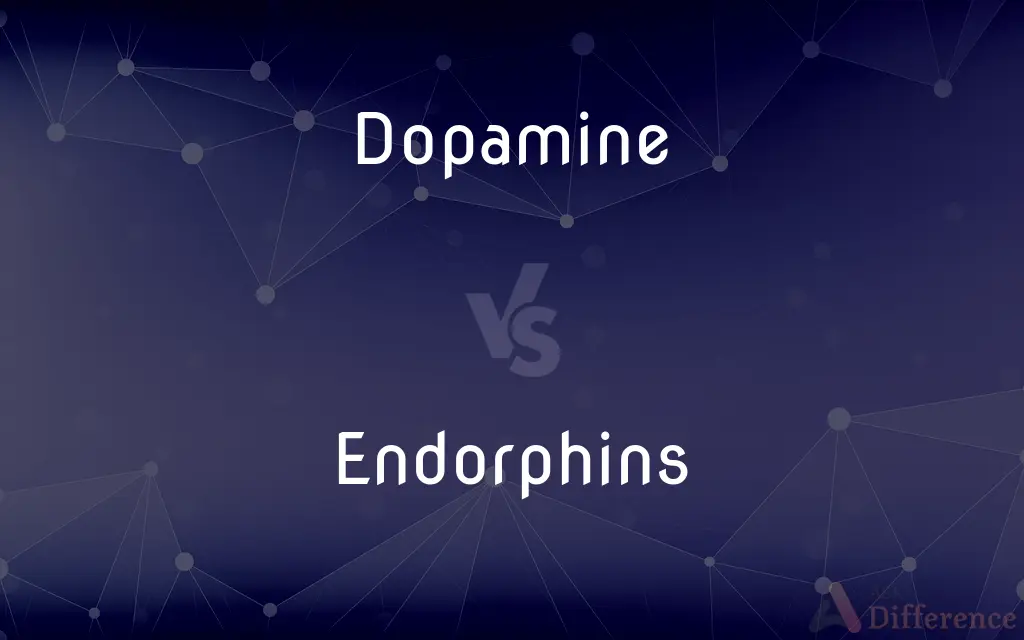Dopamine vs. Endorphins — What's the Difference?
By Tayyaba Rehman — Published on November 4, 2023
Dopamine is a neurotransmitter linked to reward and pleasure, while endorphins are peptides that act as natural pain and stress fighters.

Difference Between Dopamine and Endorphins
Table of Contents
ADVERTISEMENT
Key Differences
Dopamine, widely recognized within neuroscientific realms, prominently functions as a neurotransmitter that regulates mood, reward, and pleasure, contributing to the experience of enjoyment and reinforcement which motivates a proactive demeanor within individuals. Contrarily, Endorphins, manifesting predominantly as peptides, operate primarily in mitigating pain and inducing sensations of euphoria, inherently embodying an analgesic and wellbeing-imbuing nature. The juxtaposition between the reward-centric and pain-alleviating features of Dopamine and Endorphins, respectively, unveils a landscape of interlacing, yet distinctly individual, physiological and psychological operations.
Delving into the mechanics of Dopamine reveals its inherent capacity to modulate numerous aspects, such as movement, motivation, and the establishment of rewarding associations, thereby influencing behavior and decision-making. Contrastingly, Endorphins are largely reputed for their capacity to elevate mood and provide pain relief, naturally surfacing during stress and discomfort, serving as an intrinsic painkiller. Thus, while Dopamine navigates through the realms of motivation and reward management, Endorphins seamlessly function as internally-produced opiates, alleviating physical and emotional discomfort.
Investigating Dopamine further illuminates its crucial role in various bodily functions and neurological disorders, such as Parkinson's disease, due to its integral involvement in motor control. Endorphins, when explored, reveal a tendency to become elevated during activities like exercise, eliciting a phenomenon often termed as a “runner's high”, providing not only an analgesic effect but also a pronounced elevation in mood. Herein, the specific roles and influences of Dopamine and Endorphins underscore the complexity and multilayered nature of neurotransmission and peptide action within the human body.
The influential reach of Dopamine extends into various psychological, neurological, and psychiatric conditions, including depression, schizophrenia, and other dopamine-related disorders, highlighting its integral nature within neurological health and disease. On the other hand, Endorphins interact significantly with the opiate receptors in the brain, enabling their renowned pain-relieving and mood-enhancing effects, which could possess implications in stress management and emotional regulation strategies. Through their specific and varying impacts, Dopamine and Endorphins play crucial, yet distinctly different roles in maintaining psychological and physiological equilibrium.
Evidently, Dopamine and Endorphins both exhibit pronounced, impactful influences upon the physical and psychological wellbeing of an individual, orchestrating a symphony of interactions that influence mood, pain perception, and overall experience of life. Navigating through the varied pathways and mechanisms of these biochemical entities enlightens a vibrant tapestry of interconnected biological functions, wherein Dopamine and Endorphins emerge as potent influencers of numerous aspects of human existence and psychological health, despite their distinct and varied functionalities.
ADVERTISEMENT
Comparison Chart
Chemical Classification
Neurotransmitter
Peptides
Primary Functions
Regulates mood, reward, and pleasure
Provide pain relief and elevate mood
Involvement in Disorders
Integral in Parkinson's, depression, etc.
Associated with stress management
Response to Exercise
Influences motivation and reward
Elicit a “runner's high”
Impact on Behavior
Influences motivation and decision-making
Alleviate pain, inducing feelings of well-being
Compare with Definitions
Dopamine
Reward Mechanism
Dopamine plays a crucial role in the brain's reward mechanism, encouraging repeated behaviors.
Endorphins
Mood Enhancement
Elevated levels of endorphins can enhance mood and provide a sense of euphoria.
Dopamine
Neurotransmitter
Dopamine, a neurotransmitter, is vital for transmitting signals in the brain and other areas of the central nervous system.
Endorphins
Stress Response
Endorphins are released in response to stress and pain, acting as natural coping mechanisms.
Dopamine
Mood Regulation
Dopamine levels influence mood and emotional responses, impacting overall mental health.
Endorphins
Exercise Relation
Physical activities like running can boost endorphin levels, contributing to the 'runner’s high'.
Dopamine
Motor Control
Dopamine is integral to motor control and is significantly involved in movement regulation.
Endorphins
Opiate Receptors
Endorphins interact with the brain’s opiate receptors, diminishing the perception of pain.
Dopamine
A monoamine neurotransmitter formed in the brain by the decarboxylation of dopa and essential to the normal functioning of the central nervous system. A reduction in its concentration within the brain is associated with Parkinson's disease.
Endorphins
Pain Relief
Endorphins are natural pain relievers, mitigating discomfort by inhibiting pain signals.
Dopamine
A monoamine C8H11NO2 that is a decarboxylated form of dopa, present in the body as a neurotransmitter and a precursor of other substances including adrenalin.
Endorphins
Any of a group of peptide hormones that bind to opioid receptors and act as neurotransmitters. Endorphins reduce the sensation of pain and affect emotions.
Dopamine
A monoamine neurotransmitter found in the brain and essential for the normal functioning of the central nervous system; as a drug (trade names Dopastat and Intropin) it is used to treat shock and hypotension
Endorphins
Plural of endorphin
Common Curiosities
What are Endorphins?
Endorphins are peptides that provide pain relief and induce feelings of euphoria.
How does Dopamine influence behavior?
Dopamine influences behavior by affecting mood, motivation, and the perception of reward.
How does physical activity impact Endorphin levels?
Physical activity often elevates endorphin levels, which can enhance mood and provide pain relief.
What is Dopamine?
Dopamine is a neurotransmitter that plays a pivotal role in regulating mood, reward, and pleasure.
What roles does Dopamine play in Parkinson’s disease?
Parkinson’s disease is associated with a decline in dopamine-producing neurons, affecting motor control and movement.
Is there a link between Dopamine and addiction?
Yes, the dopamine reward pathway is associated with reinforcing behaviors, which can be linked to the development of addictions.
How are Endorphins and opiates related?
Endorphins interact with the same receptors as opiates, modulating pain perception and potentially inducing feelings of wellbeing.
Are Endorphins related to the “runner’s high”?
Yes, the “runner’s high” is often attributed to elevated levels of endorphins during physical activity.
What induces the release of Endorphins?
Endorphins are typically released during stress, pain, and physical activities like exercise.
Can Dopamine levels affect mental health?
Yes, imbalances in Dopamine levels can influence various aspects of mental health and can be associated with conditions like depression.
How are Endorphins related to pain management?
Endorphins can inhibit pain signals, acting as natural painkillers and thus, playing a role in pain management.
Can Endorphins mitigate stress effects?
Yes, endorphins can elevate mood and alleviate stress effects by acting as natural mood enhancers.
Can diet impact Dopamine levels?
Yes, certain foods and nutrients can influence the production and release of Dopamine.
How are Dopamine and Endorphins related to wellbeing?
Dopamine is associated with reward and pleasure, while Endorphins are related to pain relief and euphoria, both contributing to aspects of wellbeing.
How does Dopamine interact with the reward system?
Dopamine is fundamental to the brain’s reward system, encouraging the repetition of behaviors that incite pleasure or reward.
Share Your Discovery

Previous Comparison
ASP vs. DSP
Next Comparison
Climalite vs. ClimacoolAuthor Spotlight
Written by
Tayyaba RehmanTayyaba Rehman is a distinguished writer, currently serving as a primary contributor to askdifference.com. As a researcher in semantics and etymology, Tayyaba's passion for the complexity of languages and their distinctions has found a perfect home on the platform. Tayyaba delves into the intricacies of language, distinguishing between commonly confused words and phrases, thereby providing clarity for readers worldwide.











































